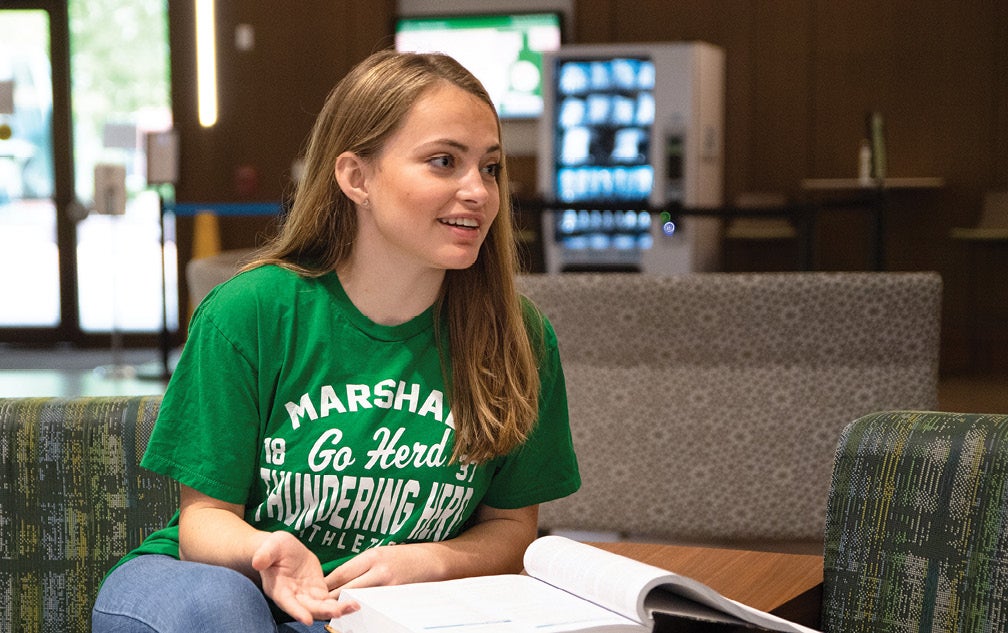 One of the Big Five focus areas is improving the student experience, and students themselves are leading several initiatives to effect change in that area. It starts with recognizing that one size doesn’t fit all, said Marshall President Brad D. Smith.
One of the Big Five focus areas is improving the student experience, and students themselves are leading several initiatives to effect change in that area. It starts with recognizing that one size doesn’t fit all, said Marshall President Brad D. Smith.
“Part of our Strategic Enrollment Plan is recognizing that we’re not just enrolling recent high school graduates,” Smith explained. “A nontraditional student expects a different college experience than a student coming straight out of a local high school. A veteran expects something different than a working parent with a child at home.”
Seeing the need for better inclusion of diverse, nontraditional and commuter students, as well as for expanded mental health services, Marshall’s student leaders are working to promote campus connections.
“We want every student to feel like they’re being heard and have a role in the Marshall community,” explained Student Body President Isabella Griffiths. “No voice is bigger or smaller than another. Everyone can contribute.”
The Intercultural Center, which opened last spring, houses the LGBTQ+ Office, Office of Student Success, Center for African American Students, Center for International Student Affairs and English Language Institute. It also houses a lounge area where students can relax and connect, Griffiths said.
“It’s a space where you can learn about different sexualities, ethnicities, gender identifications, religions — all the things that make you unique,” she said. “It’s a space to share your story and learn from others’ stories.”
The Intercultural Center is one of several small lounge areas on campus that students can take advantage of, said Student Body Vice President Walker Tatum. Some of the lounge areas, like a space located in the Women’s and Gender Center, can even be reserved for individual use.
“You can sign in, dim the lights and just take a breather,” Tatum said, adding that the smaller lounge areas are especially beneficial to commuter students who don’t have a dorm where they can go to relax. “Sometimes you don’t want to be in a populated area like the student center or the plaza. Having these little spaces tucked away is really important.”
Mental health initiatives and services are also key to a more inclusive student experience, he said.
“College isn’t easy, and Bella and I are the first to say, ‘It’s OK not to be OK,’” Tatum said. “But Marshall has so many resources that students can use. We want students to know that there are things they can take advantage of whenever they feel the need to.”
He said therapy dogs through the MU PAWS program are becoming increasingly popular, and the Counseling Center recently hired additional counselors to improve access to counseling services. For students who’d prefer to reach out to a peer for support, the Green Bandana Initiative offers peer-level mental health assistance. Students who join the Green Bandana Initiative go through mental health first aid training and QPR (Question, Persuade, Refer) suicide prevention training, then receive green bandanas that they display on their backpacks or elsewhere to show that they’re a safe person to turn to for help.
“So many people have participated in the trainings,” Tatum said. “It’s nice to see the green bandanas all around campus.”
As Griffiths and Tatum work to spread awareness about the initiative and other mental health resources, Griffiths said she hopes students also know that they can always come to her.
“We’re always here for the students,” she said. “They’ve put their faith in us to represent them, and our doors are always open to them.”
She said one of her priorities as president is to facilitate opportunities for students to be heard, with events like “Popsicles with the President” and “Mochas with the Mayor” designed to promote civic engagement. She’s also working to reinstate the Marshall University House of Delegates to encourage collaboration among Marshall’s clubs, organizations and athletic teams.
“We want students to feel connected not only on campus but also out in the community,” she said. “We want them to make their voices heard.”
————
About the author: Katherine Pyles is a freelance writer living in Huntington, West Virginia. She is a 2009 graduate of the Marshall University School of Journalism and Mass Communications.
Photo: Student Body President Isabella Griffiths is leading several mental health initiatives for students who are facing any challenges.